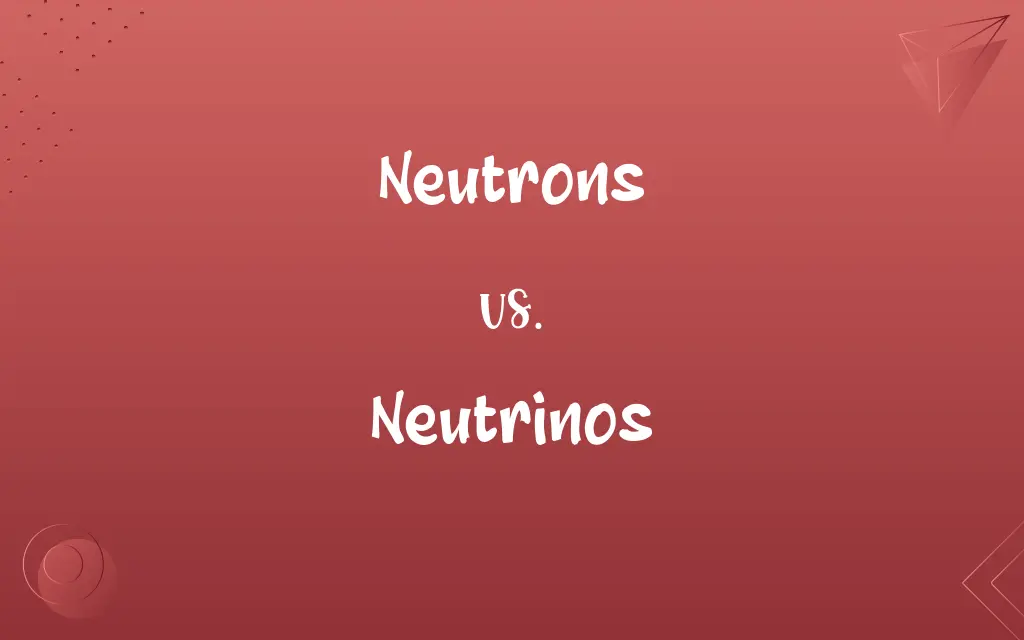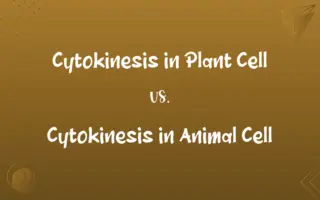Neutrons vs. Neutrinos: Know the Difference

By Shumaila Saeed || Published on January 1, 2024
Neutrons are neutral particles in atomic nuclei, essential for atomic stability, while neutrinos are nearly massless, chargeless particles emitted in nuclear reactions.

Key Differences
Neutrons, found in the nucleus of atoms, contribute to atomic mass and stability, preventing proton repulsion. Neutrinos, in contrast, are not part of atomic structure but are byproducts of nuclear reactions, influencing astrophysical processes but not atomic stability.
Shumaila Saeed
Jan 01, 2024
Neutrons were discovered in 1932 by James Chadwick, revolutionizing understanding of atomic structure. Neutrinos, proposed by Wolfgang Pauli in 1930 and detected in 1956, have been a subject of extensive research in particle physics and astrophysics, revealing much about the universe's workings.
Shumaila Saeed
Jan 01, 2024
Neutrons, having mass but no charge, play a key role in nuclear reactions and decay processes. Neutrinos are incredibly light and nearly non-interacting, able to pass through matter with little to no interaction, making their detection challenging.
Shumaila Saeed
Jan 01, 2024
In nuclear reactors, neutrons are crucial for sustaining fission reactions and producing energy. Neutrinos, emitted in nuclear reactions, including those in the sun, provide insights into these processes but do not directly contribute to energy production.
Shumaila Saeed
Jan 01, 2024
Neutrons have been instrumental in the development of nuclear physics and technology. Neutrinos, by revealing properties like neutrino oscillation, have challenged and refined the Standard Model of particle physics.
Shumaila Saeed
Jan 01, 2024
ADVERTISEMENT
Comparison Chart
Role in Nuclear Reactions
Crucial in nuclear fission and fusion
Emitted as byproducts in nuclear reactions
Shumaila Saeed
Jan 01, 2024
Interaction with Matter
Interacts strongly with atomic nuclei
Passes through matter with minimal interaction
Shumaila Saeed
Jan 01, 2024
ADVERTISEMENT
Neutrons and Neutrinos Definitions
Neutrons
A subatomic particle in the nucleus of an atom with no electric charge.
Neutrons, along with protons, make up the nucleus of an atom.
Shumaila Saeed
Dec 18, 2023
Neutrinos
Emitted in nuclear reactions, including those in stars.
Neutrinos from the sun provide insight into solar processes.
Shumaila Saeed
Dec 18, 2023
Neutrons
A particle essential for the stability of most atomic nuclei.
The number of neutrons in an atom affects its isotope.
Shumaila Saeed
Dec 18, 2023
Neutrinos
A fundamental particle important in astrophysical studies.
Studying neutrinos helps us understand the universe's fundamental forces.
Shumaila Saeed
Dec 18, 2023
Neutrons
Discovered by James Chadwick, it's fundamental in nuclear physics.
The discovery of the neutron was pivotal in understanding atomic structure.
Shumaila Saeed
Dec 18, 2023
ADVERTISEMENT
Neutrinos
A nearly massless subatomic particle that is electrically neutral.
Neutrinos are elusive due to their weak interactions with matter.
Shumaila Saeed
Dec 18, 2023
Neutrons
Heavier than an electron and neutrally charged.
Neutrons balance the positive charge of protons in an atom's nucleus.
Shumaila Saeed
Dec 18, 2023
Neutrinos
Key in testing and refining the Standard Model of particle physics.
Neutrino oscillations presented a challenge to initial particle physics theories.
Shumaila Saeed
Dec 18, 2023
Neutrons
A key player in nuclear reactions and processes.
Neutrons are released during nuclear fission.
Shumaila Saeed
Dec 18, 2023
Neutrinos
Travels close to the speed of light, interacting rarely with matter.
Billions of neutrinos pass through us unnoticed every second.
Shumaila Saeed
Dec 18, 2023
Neutrons
The electrically neutral nucleon, a baryon composed of two down quarks and one up quark, which has a mass 1,839 times that of an electron, is stable when bound in an atomic nucleus, but has a mean lifetime of 886 seconds as a free particle. It is a basic component of all atomic nuclei except the protium isotope of hydrogen.
Shumaila Saeed
Dec 13, 2023
Neutrinos
Any of three electrically neutral leptons (the electron neutrino, muon neutrino, and tau neutrino—one in each of the three generations of elementary fermions) that have very small masses.
Shumaila Saeed
Dec 13, 2023
Repeatedly Asked Queries
What is a Neutrino?
A nearly massless, chargeless particle emitted in nuclear reactions.
Shumaila Saeed
Jan 01, 2024
Why are Neutrons important in nuclear reactions?
They facilitate and sustain reactions like fission and fusion.
Shumaila Saeed
Jan 01, 2024
How do Neutrons differ from Neutrinos?
Neutrons are part of atomic nuclei; neutrinos are emitted in nuclear processes.
Shumaila Saeed
Jan 01, 2024
Why are Neutrinos hard to detect?
They interact very weakly with other matter.
Shumaila Saeed
Jan 01, 2024
Can Neutrons be found outside the nucleus?
Yes, as free neutrons, but they are unstable and decay quickly.
Shumaila Saeed
Jan 01, 2024
What did the discovery of Neutrons lead to?
A deeper understanding of atomic structure and nuclear physics.
Shumaila Saeed
Jan 01, 2024
Can Neutrons exist independently?
Briefly, as free neutrons, but they decay into protons, electrons, and neutrinos.
Shumaila Saeed
Jan 01, 2024
Are Neutrons heavier than Neutrinos?
Yes, neutrons are significantly heavier than neutrinos.
Shumaila Saeed
Jan 01, 2024
What makes Neutrinos unique in particle physics?
Their extremely low mass and weak interaction with matter.
Shumaila Saeed
Jan 01, 2024
Do Neutrons have any practical applications?
Yes, in nuclear reactors and medical imaging technologies.
Shumaila Saeed
Jan 01, 2024
Do Neutrinos have any role in atomic structure?
No, they are not part of atomic structure.
Shumaila Saeed
Jan 01, 2024
How do Neutrinos inform us about the universe?
They provide insights into stellar processes and fundamental forces.
Shumaila Saeed
Jan 01, 2024
What role do Neutrons play in isotopes?
The number of neutrons determines the isotope of an element.
Shumaila Saeed
Jan 01, 2024
Do Neutrinos play a role in nuclear technology?
Not directly, but their study is crucial in understanding nuclear processes.
Shumaila Saeed
Jan 01, 2024
What does a Neutron consist of?
Quarks, held together by the strong nuclear force.
Shumaila Saeed
Jan 01, 2024
What do Neutrino oscillations reveal?
They indicate that neutrinos have mass and change flavors.
Shumaila Saeed
Jan 01, 2024
How were Neutrinos first theorized?
As a solution to the missing energy problem in beta decay.
Shumaila Saeed
Jan 01, 2024
Are Neutrinos affected by gravity?
Yes, but their small mass makes the effect negligible.
Shumaila Saeed
Jan 01, 2024
Share this page
Link for your blog / website
HTML
Link to share via messenger
About Author
Written by
Shumaila SaeedShumaila Saeed, an expert content creator with 6 years of experience, specializes in distilling complex topics into easily digestible comparisons, shining a light on the nuances that both inform and educate readers with clarity and accuracy.


































































